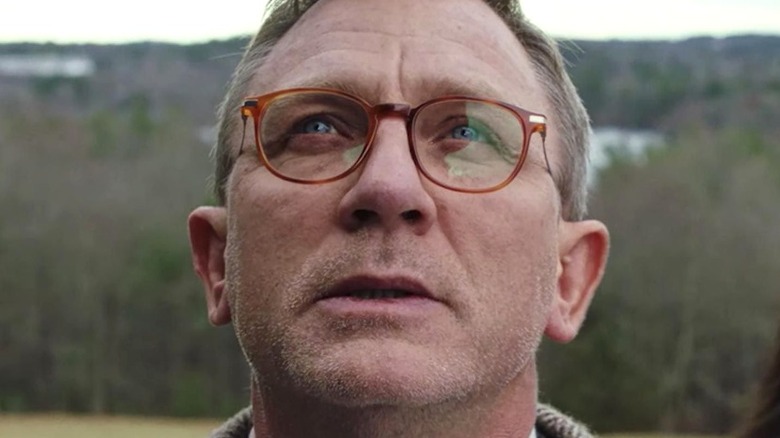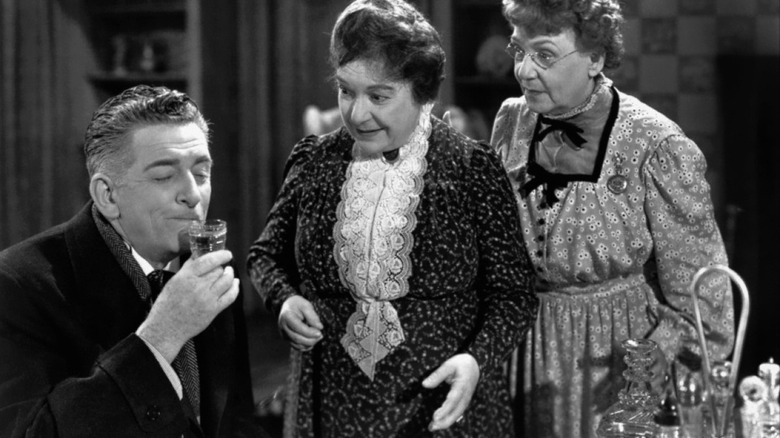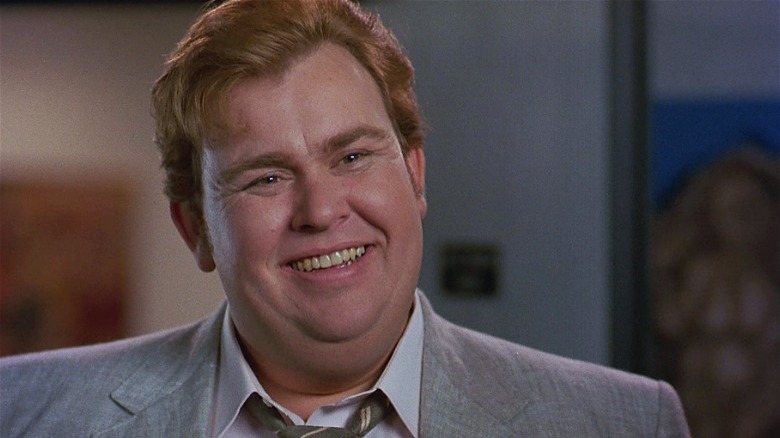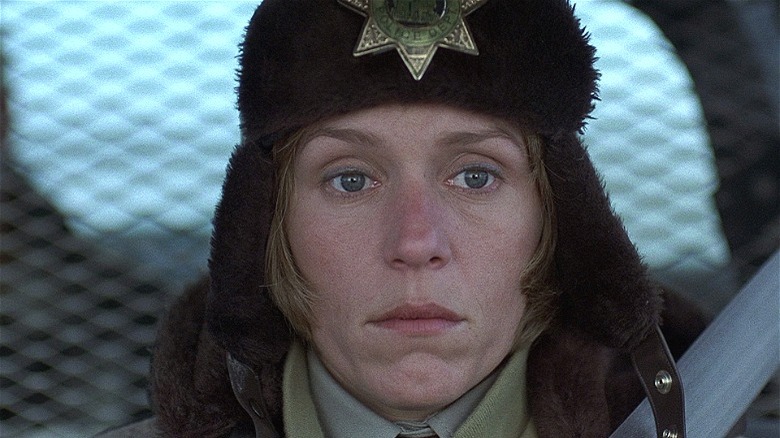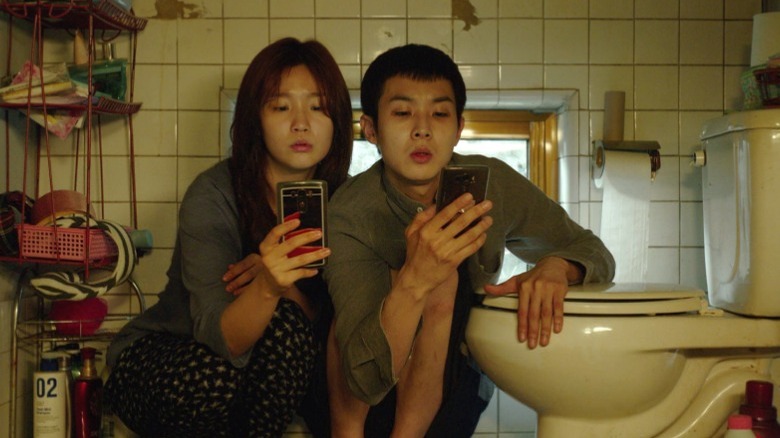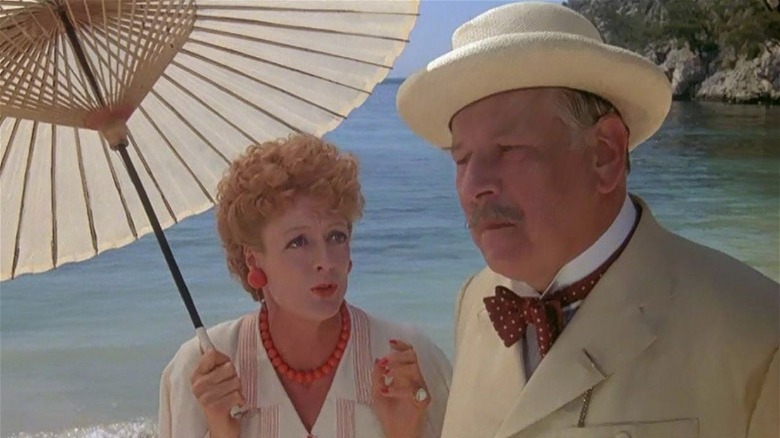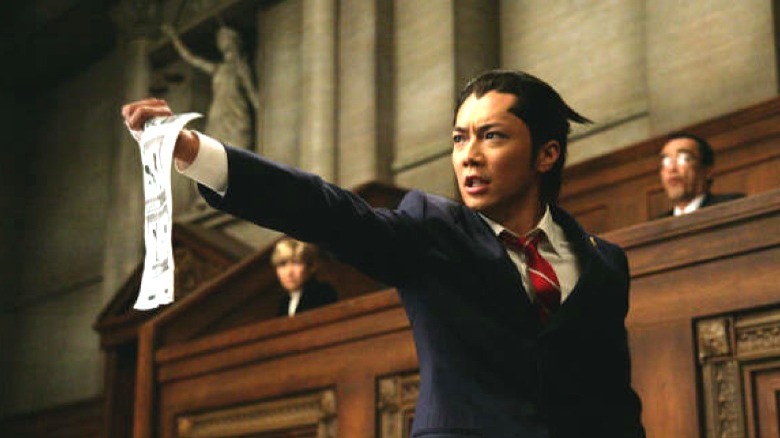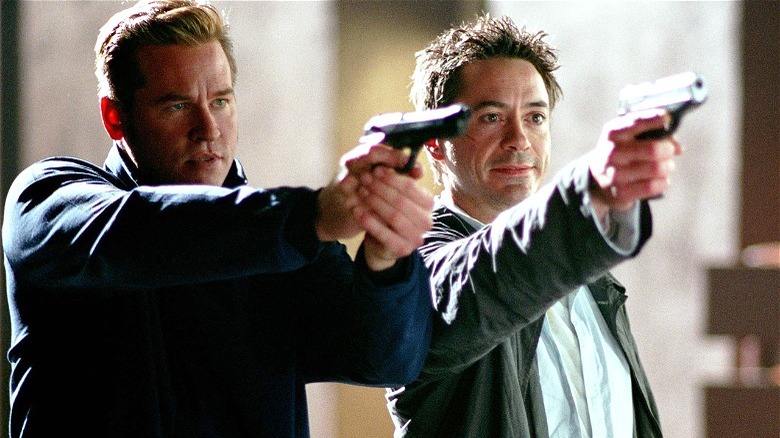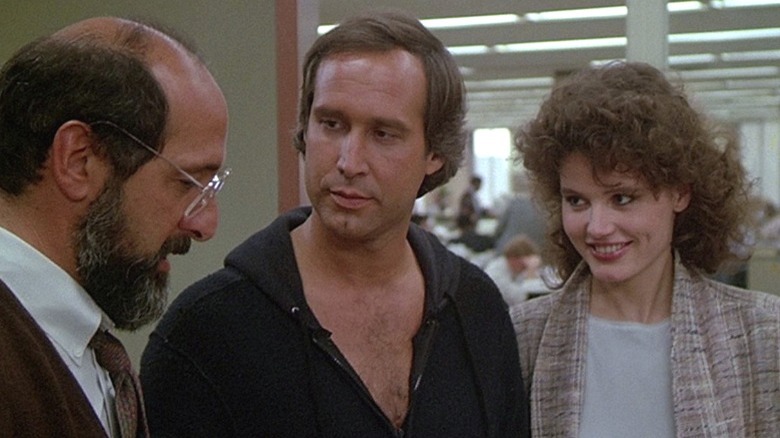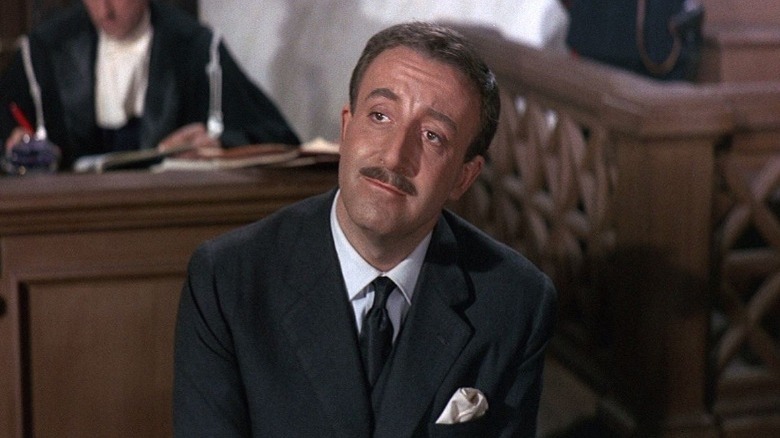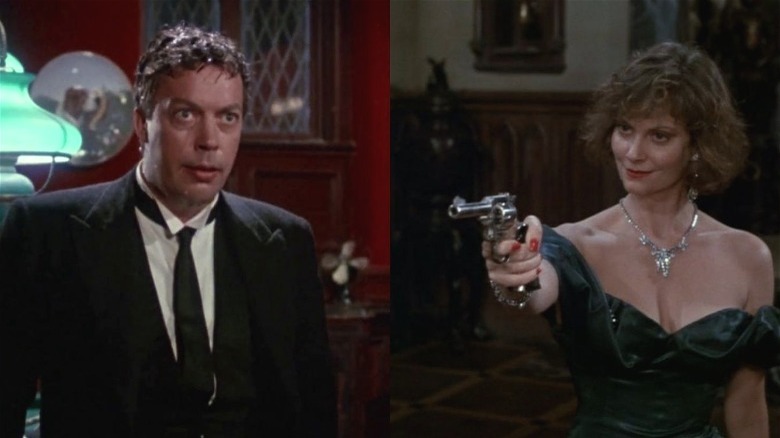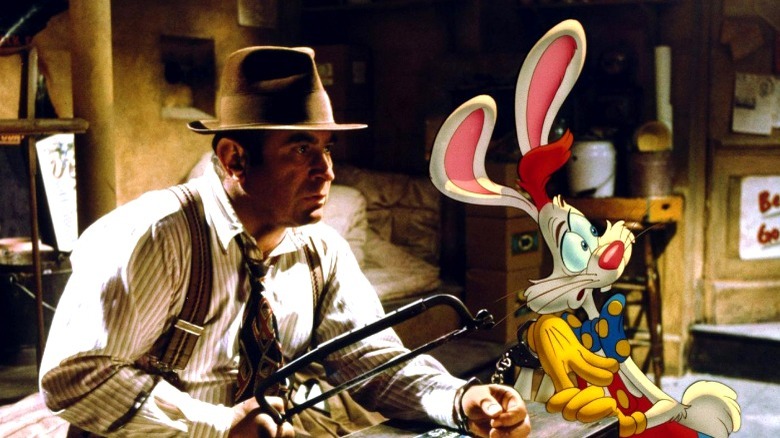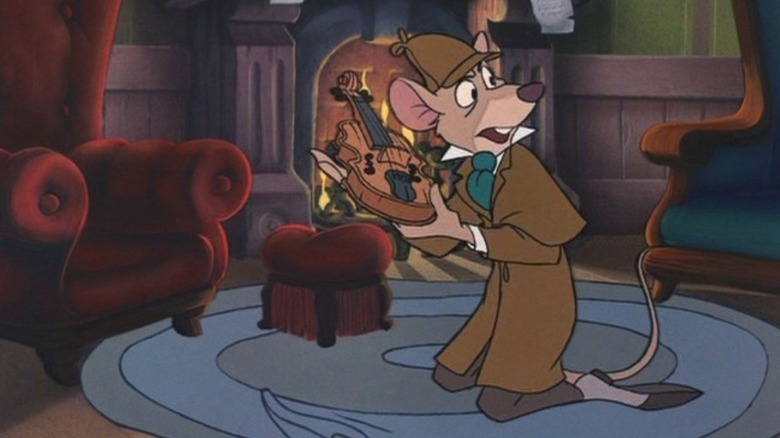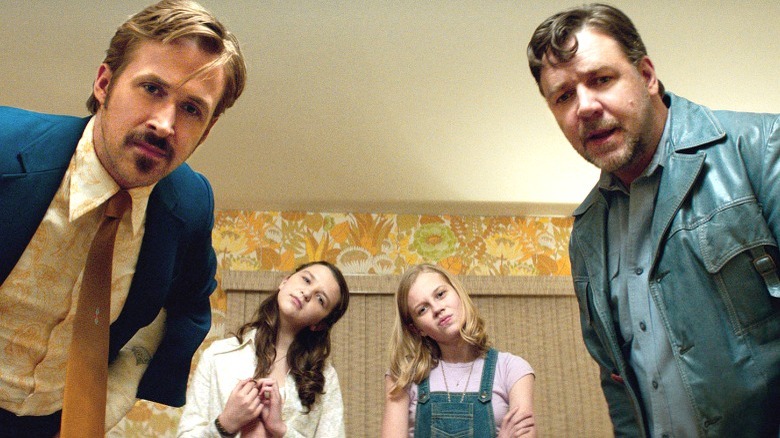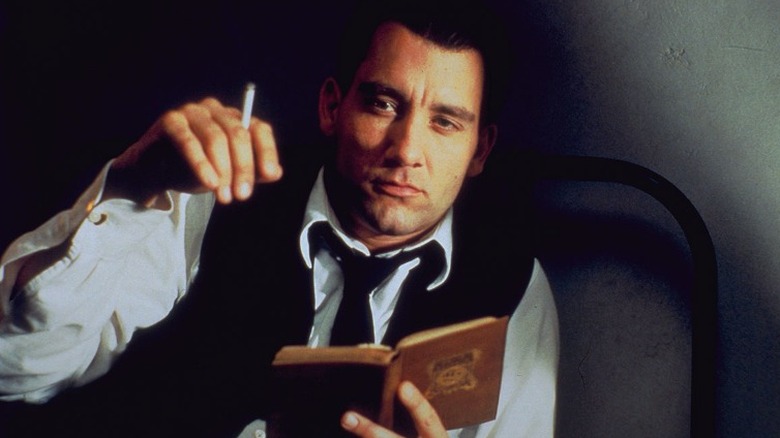14 Movies Like Knives Out That You'll Want To Watch ASAP
"Knives Out" does a lot of things right. The film, directed by Rian Johnson and starring some of Hollywood's best (a trend that's continuing in its upcoming sequel), may feel unique in its blend of comedy, murder, and sly social commentary. But the comedy mystery is actually one of Hollywood's oldest genres, one that's rarely shy about slipping in a biting statement here and there. A comedy mystery can be sleek or slapstick, dumb or wise, or all of those things at once.
Mystery comedies first peaked during the Golden Age of Hollywood. "The Thin Man" and its witty married couple, Nick and Nora Charles, sparked an early thriller franchise and set the stage for funny films about gritty material. Like "Knives Out," "The Thin Man" also deftly uses a visual twist that makes the audience reevaluate the scene of the crime. In the '60s, "The Pink Panther" became a blockbuster, codifying the archetype of the daffy detective through its hapless Inspector Clouseau.
"Knives Out" and its eccentric but clever detective Benoit Blanc draws from many old classics like these, in addition to some more modern movies. In this list, we'll go over some of these films, plus a few others that highlight the themes running through Johnson's darkly hilarious movie.
Arsenic and Old Lace
Once a piece of media hits big elsewhere, Hollywood never sleeps on turning it into a blockbuster movie. "Arsenic and Old Lace" was the Broadway juggernaut of 1941, and the film adaptation was released to nearly equal acclaim in 1944. Its success is in its humor: quick, dry, and as dark as a trucker's morning coffee. The Brewster family is a sprawling testament to American tenacity, descendants of the first European settlers. The downside is that they're all willing to kill you with a smile.
Mortimer is the family's mostly-sane ramrod, a young theatre critic who has to deal with the sort of things all that young professionals must grapple with: love, marriage, financial security, that one weird aunt, her equally weird sister, and the corpse hidden in their window seat. Cary Grant's baffled charm and Boris Karloff's happy turn as a metafictional version of himself make this film almost ageless despite the '40s setting. Mortimer Brewster, with his strained family ties, would only be too happy to give Marta a comforting hug after the events of "Knives Out."
Who's Harry Crumb
Harry Crumb is not a good detective. He's not smart. He's not observant. He couldn't put a 100-piece jigsaw puzzle together, even with step-by-step instructions. His 1989 movie, "Who's Harry Crumb," isn't exactly a masterpiece, dunked on by critics and failing at the box office. But Harry is played by John Candy, replete with that warm, huggable charm Candy brought to the bulk of his roles, and that makes this movie worth at least a little of our time.
Harry is brought onto a high profile kidnapping precisely because he's a sweet-natured lunk. He's not meant to solve the riddle of who abducted the young heiress of the Downing family. But through good luck and the help of the Downing's other daughter, he pulls off a "Producers"-level chain of accidental competence. It's not a deep mystery, and the laughs aren't as rich as they are in some of John Candy's better films, but "Who's Harry Crumb" is still a pleasant jolt of '80s fun.
Fargo
The 1996 Coen brothers film "Fargo" slyly establishes a crucial truth that all crime buffs need to understand in its first seconds: Everyone lies. At least, everyone is definitely lying in "Fargo," including the title cards. There's no true story here, despite what the credits say. However, there are glimpses of honest human behavior in the North Dakota emptiness, where the blackest comedy is set against snowy white plains.
Jerry Lundegaard's big lie about his wife (Jerry hired two men to kidnap her himself, hoping to collect a ransom from her family) spirals out of his control fast, and he can't understand that he never had control in the first place. His father-in-law, Wade, lies to him habitually, never giving Jerry any agency. The tragedy that follows is Lundegaard's fault, but it's not hard to see how Wade helped Jerry's actions get out of hand. The only somewhat honest character in this film is one half of the duo that Jerry hires, the stoic but terrifying Gaear, played by Peter Stormare. That's because he's an emotionless husk, incapable of caring enough about anything to lie about it.
Parasite
The only film on this list that's not a mystery, "Parasite" is still a thematic companion to "Knives Out" in important ways. Bong Joon-ho's Academy Award-winning thriller keeps its focus on a social divide so wide that, on the macro scale, it's on the verge of destroying South Korean society. South Korea isn't the only country that's both split this way and is keenly aware of that fact, which helped make the film a global sensation. The strain between the lower-class Kims and the upper-class Park family isn't the only breaking point; there's a secretive third party that puts the final, tragic act of the film into motion.
The Park family is privileged, used to a life of comfort and entitlement that make them fit right in among the more rarified members of the Thrombey-Drysdale clan. The Kims would find one of their own in Marta, daughter of an impoverished illegal immigrant. But the resolutions of these two films take vastly different turns. While "Parasite" doesn't shy away from its story's depressingly realistic fallout, "Knives Out" offers a gentler fantasy after unleashing an avalanche of ingrained racism, revealing a new kind American dream that Marta can enjoy.
Evil Under the Sun
Agatha Christie didn't write laugh-a-minute murder mysteries, but her work clearly influenced "Knives Out," and a visit with her best-known creation is a useful way to learn the dos and do nots of the genre. Hercule Poirot is Christie's famous Belgian investigator, an exacting and dignified individual who, like Blanc, relies more on studying humanity's flaws than the physical evidence alone.
1982's "Evil Under the Sun" is a good introductory point for mystery fans who want to get to know Poirot without committing to the massive but excellent "Poirot" TV series. Here, Poirot is played by Peter Ustinov, and must watch wits with an island palace hostess played by Dame Maggie Smith. The mystery of a fake diamond ring and a murdered woman make for taut viewing, with the beautiful island surroundings marred by the greed of its guests and the fresh blood on the sand. Poirot is an intellectual, and when it comes to a brawl, it's not his time to shine. That makes this detective more humble and more human than his predecessor, Arthur Conan Doyle's Sherlock Holmes.
Ace Attorney
Takashi Miike is a director with a shocking breadth of ability. Best known for audacious, hyper-violent films like "Ichi the Killer," he'll casually upend expectations with imaginative children's fantasies like "The Great Yokai War." His "Ace Attorney" adaptation is closer to that family-friendly end of the spectrum, understanding its wacky source material so well that it elevates the results into one of the best video game movies of all time.
"Ace Attorney" is a moderately successful but fiercely loved series of visual novel video games that pits a daffy but kind defense attorney against a changing slate of cynical and corrupt prosecutors. It's goofy stuff, but underneath it all is a lot of satirical commentary about the Japanese legal system. That subversive tone makes Miike the right director for this adaptation, despite the otherwise straightforward comedy.
This 2012 film adapts most of the first game in the series, keeping the game's style and tone close to its heart. It's a delightful import that shows how both the intricacy and irreverence that fuels "Knives Out" can be found worldwide.
Kiss Kiss, Bang Bang
Shane Black's directorial debut, "Kiss Kiss, Bang Bang," also serves as a prelude to the rebirth of Robert Downey Jr.'s career. With Val Kilmer as Downey's sharply sarcastic foil, the result is one of the best crime caper films of the last 50 years. It's an updated spin on a now-obscure crime novel written by Brett Halliday called "Bodies Are Where You Find Them" that jams a few Raymond Chandler gags in between the rapid-fire dialogue that's core to Black's bleakly irrelevant style. It's an over-full mess that works.
The plot of "Kiss Kiss, Bang Bang" is a whirlwind, but it is consistent if you can pay attention to its twists and turns. It's also richly absurdist, using a broken fourth wall to ensure the audience knows how high the stakes are — ie, nonexistent, because "Kiss Kiss, Bang Bang" knows it's a movie. Black revels in that freedom with a self-deprecating wit that, instead of taking the viewer out of the story, makes you feel like a table-side participant — or accomplice — at a shockingly good dinner theatre.
Fletch
The '80s saw Chevy Chase reach a level of success that he's never enjoyed since, mostly for good reason. Though Clark Griswold's antics are an annual fixture of any Christmas movie marathon, dedicated mystery buffs may better remember Chevy's investigative reporter Irwin M. Fletcher, better known as "Fletch."
Only vaguely based on a successful series of crime novels, "Fletch" sets Chase loose to do two things he excelled in: knock out a bunch of raunchy ad libs in quick succession, and go wild with costumes and props. Many of Chase's jokes, it should be noted, probably aren't going to land well today. However, their timing and setup are still worth studying. Somewhere in the mix is a pretty good story about a reporter who teases out the truth about a murder-for-hire scheme, but let's face it, that's not what this movie is about. The golden era of Chevy Chase didn't last, but "Fletch" shows off the heights of his ability.
The Pink Panther
Benoit Blanc can trace his DNA straight back to a handful of archetypal characters, and Inspector Jacques Clouseau in 1963's "The Pink Panther" is one of Blanc's clearest ancestors. Daniel Craig is marvelous as Blanc, as the role gives him a cheeky freedom that he can't get while making a Bond film. But Peter Sellers is simply unhinged. He's an as-yet unmatched frenzy of comedic timing, both shameless and speedy. Before Robin Williams, Peter Sellers knew no limits.
The star of "The Pink Panther" is supposed to be the charming jewel thief Lytton, who is obsessed with stealing the famous Pink Panther diamond. Played by David Niven, Lytton would have been the standout in any sensible heist film. But Clouseau quickly steals the movie away from the thief by virtue of his endearing, unceasing incompetency. The matter of the unique pink diamond is certainly resolved by the time the film closes, but it's not due to anything deliberate on Clouseau's part. "The Pink Panther" is a classic comedy mystery for a reason, and Clouseau remains one of Sellers' best roles.
Clue
On the slapstick cult movie end of things, it's hard to have a bad murder mystery night with a bag of chips, a set of reasonable expectations, and a copy of 1985's "Clue." It's the "Knives Out" boardgame, with an eccentric cast of characters brought to a stately mansion due to some hidden connection they all share. Once the Boddy hits the floor, Tim Curry, in trim butler fit, oversees a romp of backstabbing mayhem.
Like the game it was based on, "Clue" has multiple endings, and none of them make much sense. It's one of the few films to succeed at adapting a boardgame into an enjoyable film, leaning into the campy weirdness of its premise without a moment's doubt. The main cast are mostly terrible people, leaving the audience free to enjoy whatever mishaps befall them. The only downside is that there's also no one to root for, which leaves all the endings feeling a bit flat. Nonetheless, it's a fun, dumb movie that plays some of the biggest tropes in the mystery genre to the hilt.
Who Framed Roger Rabbit
Grouchy private detective Eddie Valiant could've had a distant relative in Benoit Blanc, but since 85% of his character motivation is weighted by the death of his brother, he wouldn't want to hear about it. Bob Hoskins' hostile but secretly cuddly lead is the heart of "Who Framed Roger Rabbit," a counterweight to the literally cartoonish shenanigans going on around him. He's the straight man to Roger Rabbit, an exhausting dervish of a cel-shaded rabbit with an innocent heart beating inside of him.
There's a remarkably tight plot in this film, with clues that pay off and interactions that make sense in hindsight. Match that with one of the wildest cinematic accomplishments in film history – this is still Robert Zemeckis' best movie – and it's a flick crime fans can't miss even when it's pure looney tunes. For parents about to introduce their kids into the genre and looking at this as a jumping-on point, however, remember both the trauma induced by that poor shoe, and Jessica Rabbit's assets, and prepare in advance.
The Great Mouse Detective
Safer for little ones than "Roger Rabbit" and just as smart and charming, Disney's "The Great Mouse Detective" is a great, low-stress introduction to mystery movies. The plot is basic but well-paced Sherlock versus Moriarty fare, with some additional glitz and a few imaginative designs to spice it up. A mouse named Basil lives at a famous Baker Street address, borrowing his human neighbor's style and his sharp-nosed basset hound to solve cases in the narrow alleys of London. Ratigan, voiced by an utterly perfect Vincent Price, is his nemesis, and puts into motion a bombastic plot to conquer all of England's mousedom.
With a doofy Watson analogue on board to help solve the case, and a less-scary Reichenbach Falls-inspired finale, "The Great Mouse Detective" is a cozy movie that hits all the right notes. "The Great Mouse Detective" isn't one of Disney's most well-known films, coming in the middle of a mild '80s slump on the studio's part and landing with a thud at the box office. Today it's buried in the menus of Disney+. Whatever your age, give it a chance.
The Nice Guys
Director Shane Black knows what he's good at, which makes "The Predator" an inexplicable speed bump. Before that mess, but right after his blockbuster "Iron Man 3," Black returned to the genre he'd reinvigorated with 2016's "The Nice Guys." With "The Nice Guys," Black draws more water from the same well as "Kiss Kiss, Bang Bang," adopting another Brett Halliday novel, "Blue Murder."
Once again, the results aren't much like Halliday's gritty potboilers. Instead, "The Nice Guys" is a somewhat more competent "Big Lebowski," draped with '70s macrame and a less self-important sense of humor than "Once Upon a Time... In Hollywood." Ryan Gosling and Russell Crowe is the unlikeliest team-up since Russell Crowe and RZA, and it's surprisingly effective. "The Nice Guys" is the sort of film that leads one to hope that "Knives Out 2" will give Blanc a foil to work with, as well as a reminder that the buddy-cop motif will not only never die, but can take a convoluted caper to the next level.
Gosford Park
2001's "Gosford Park," directed by the legendary Robert Altman, is "Knives Out" with an English accent. The major differences include the incompetence of the local constable, and the fact that there's about twice as many characters to keep track of. Each one is distinct, which helps, and each one stays within the velvet rope of their social status. Upstairs does not mix with downstairs. The help know their place. But from that place, the help can see all the dirty little things going on inside the luxe country house, and a wise person knows to listen to what the servants whisper to each other.
The murder of Sir William McCordle doesn't happen right away, and by the time it does, he's not going to be mourned by most viewers. By the end of the film, it's clear the old goat had it coming, but the interpersonal relationships his death uncovers are the real mystery hiding in the heart of the manor. Our surrogate is Dame Maggie Smith's personal maid, a guileless Scottish girl who gradually figures out what Stephen Fry's disinterested cop can't. There's a tangled web all around the sprawling lawns of Gosford Park, and the stickiest parts of it are built from love.
